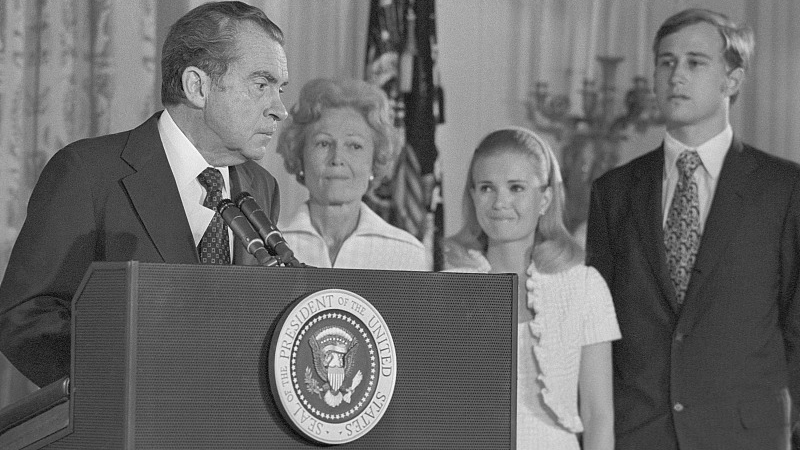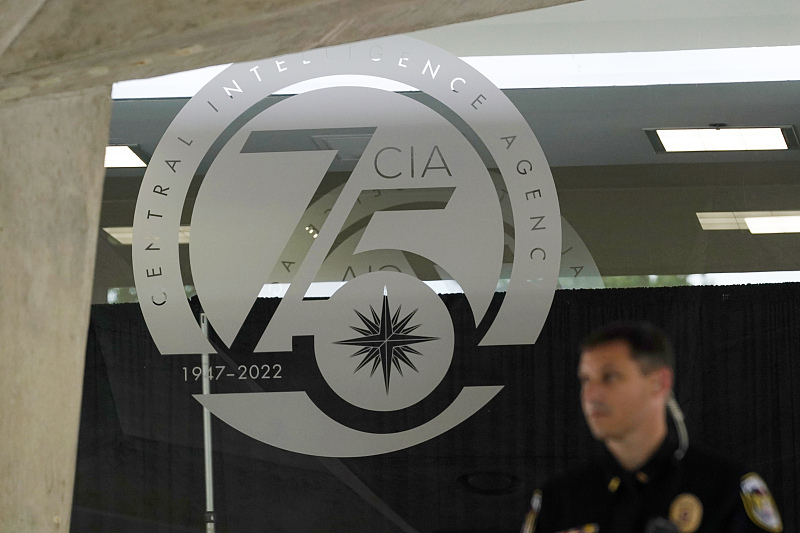
U.S. President Richard Nixon announces his resignation at the White House, Washington, D.C., U.S., August 9, 1974. /CFP
U.S. President Richard Nixon announces his resignation at the White House, Washington, D.C., U.S., August 9, 1974. /CFP
Editor's note: Nadim Siraj, author of "Secret Notes from Iran: Diary of an Undercover Journalist", and co-founder of news platform EmpireDiaries.com, is an India-based journalist who writes about conflict and current affairs. The article reflects the author's opinions, and not necessarily those of CGTN.
This summer marks 50 years since a botched bugging attempt at the Democratic Party's governing body headquarters in Washington D.C. snowballed into the spectacular fall of former U.S. President Richard Nixon.
The Watergate scandal, the biggest stain on America's political fabric, is now half a century old. Any talk of Watergate typically revolves around two popular themes. Nixon's desperate attempt to save his job before he eventually resigned. And, the heroics of young Washington Post journalists Bob Woodward and Carl Bernstein, which torpedoed the Republican presidency.
But what skirts and skips the Watergate debate is the shadowy role of the Central Intelligence Agency (CIA) in the entire episode, from start to finish.
The CIA's fingerprints
From the credentials of the wiretapping agents caught breaking into the Democratic National Committee's (DNC) offices at the Watergate complex on June 17, 1972, to players in the Nixon administration – the CIA's fingerprints were all over the scandal.
Those who think Watergate was about Republicans bugging Democrats only see the tip of the iceberg. The scandal goes deeper than political intrigue. It was about the CIA and the White House colluding to carry out a sophisticated mission targeting political opponents.
A granular look at the players involved in the scandal exposes the CIA's role. Let's start with the so-called burglars or surveillance agents sent in by Nixon's reelection team to bug the DNC offices at Watergate.
All five agents arrested were former full-time CIA operatives. Four of them had taken part in various CIA-funded activities to destabilize Fidel Castro's administration in Cuba.
Virgilio Gonzalez was hired for Watergate as an expert locksmith. Bernard Barker was hired by former CIA officer Howard Hunt as a 'plumber.' Eugenio Martínez was hand-picked also by Hunt and ex-FBI agent G Gordon Liddy. Frank Sturgis was brought in because of his role in the CIA's counterintelligence activities against Castro.
The fifth operative, James McCord, was heading the security unit of Nixon's reelection committee. Crucially, he was a former CIA officer and counterintelligence specialist hired for Watergate for his expertise in electronic bugging.
The White House link
Next, let's look at the CIA's hand higher up the hierarchy. Soon after the break-in, the Washington Post's coverage focused on the leadership role in the incident of high-profile coconspirators Hunt and Liddy.
Hunt, the former high-ranking CIA official, was at that time working as a White House employee. He had earlier helped plot the Bay of Pigs operation in the Kennedy era and had also served at the Nixon-era White House as an expert on covert activities. Hunt's Watergate partner was Liddy, a counsel at the Republican Party's Committee to Reelect the President, dubbed CREEP.
Let's probe higher up. In 2016, the CIA declassified a 155-page internal report written in 1974, titled "Working Draft: CIA Watergate History". It was an attempt to show that the agency itself wasn't involved in wrongdoing.
But crucially, the document confirms that CIA director Richard Helms had refused to share with FBI investigators information about Martinez, one of the break-in convicts and an ex-CIA man.
Nixon's CIA gambit
The White House's overreach into the intelligence community was further exposed in a taped conversation – infamously dubbed 'Smoking Gun' – six days after the Watergate break-in. The conversation took place at the Oval Office on June 23, 1972 between Nixon and his chief of staff HR Bob Halderman.
In the recording, Nixon agrees to a plan that his administration will tell CIA director Helms and CIA deputy director Vernon Walters to persuade FBI acting director Patrick Gray to pull the plug on the bureau's probe into the break-in on national security grounds.
There are even more dots to connect in the suspected CIA hidden hand in the affair. According to a report prepared on the insistence of Senator Howard Baker and shared by the Senate Watergate committee's minority staff in 1974, the agency's knowledge about the Watergate wiretap team's dealings was deeper than what the CIA had claimed.

The main entrance to the headquarters of the CIA is seen in Langley, Virginia, July 8, 2022. /CFP
The main entrance to the headquarters of the CIA is seen in Langley, Virginia, July 8, 2022. /CFP
FBI vs. CIA: War of the agencies?
It's a dark irony that Watergate also stands out as a silent war between America's two powerful intelligence agencies. On one hand, an FBI high-up's leaks led to the exposition, while on the other, Nixon's dirty tricks were carried out by ex-CIA operatives.
Fifty years on, reporters Woodward and Bernstein have rolled out a 2022 edition of their epic memoir of the coverage of Watergate, All the President's Men, with a fresh foreword that compares Nixon with Donald Trump.
Also, to mark the occasion, the U.S. government-run National Archives has digitized the paper records, artifacts, equipment, and exhibits from the high-profile Watergate trial for people all over the world to access online.
Noam Chomsky's take
Interestingly, renowned political scientist Noam Chomsky has a more holistic opinion on Watergate. He believes Nixon had made enemies in America's most powerful circles by trashing the Bretton Woods system and delinking the U.S. dollar from gold. So, it was only a matter of time that he was taken to task for any of the multiple wrongdoings of his administration – Watergate being one of them.
In his writings, Chomsky has argued that during the Nixon presidency, the FBI was conducting COINTELPRO, a covert surveillance and disruption project far worse than Watergate. Yet, explains Chomsky, Watergate and not COINTELPRO was singled out for special attention only because it could directly implicate Nixon.
"The programs for repression and stifling of political opposition [under COINTELPRO] go far beyond anything revealed in the Watergate investigations… They are far more significant than the whole collection of Watergate exposures," argues Chomsky.
'Follow the Money'
In the 1976 film, All The President's Men, actor Hal Holbrook who played FBI strongman Mark Felt uttered the timeless dialogue "Follow the money" to actor Robert Redford who played reporter Woodward. Referred to by Washington Post as "Deep Throat" back then, Felt's cryptic tip-off, though not delivered in those exact words from the movie, helped expose the money trail that funded Watergate and similar illegal operations.
Years down the line, we now know that perhaps as disturbing as the money trail in the Watergate scandal was the shadowy hand of America's much-celebrated intelligence agency, the CIA.
(If you want to contribute and have specific expertise, please contact us at opinions@cgtn.com. Follow @thouse_opinions on Twitter to discover the latest commentaries on CGTN Opinion Section.)

